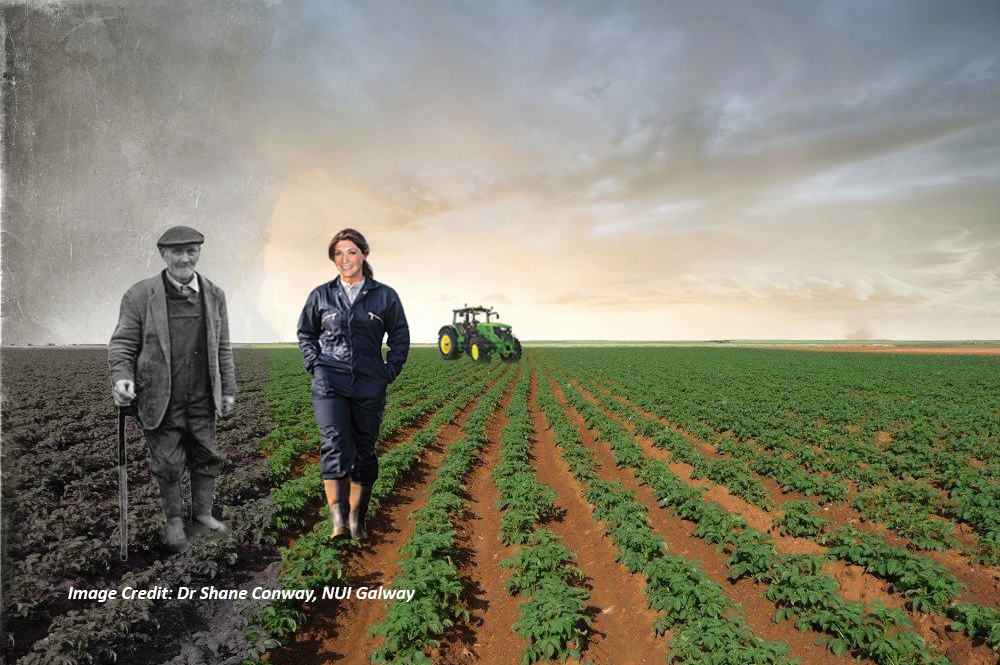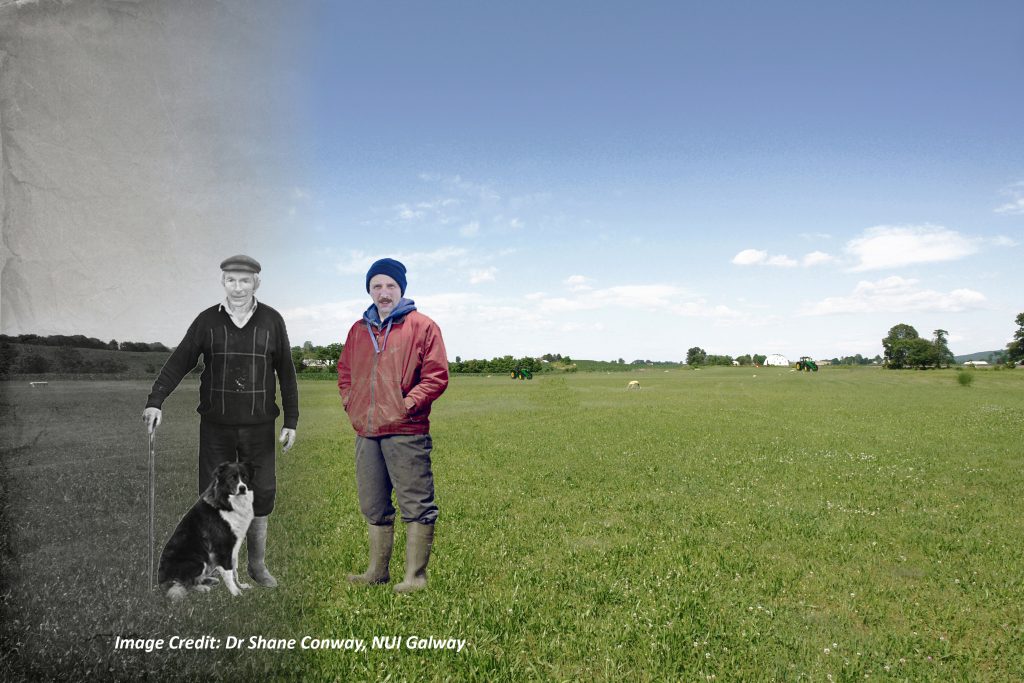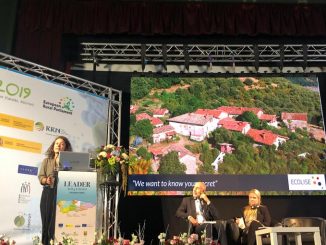How do farms pass on between the generations in a way that respects the needs of older and younger people? Share Conway and colleagues argue for an approach that allows older farmers to maintain and sustain normal day to day activity and behaviour on their farms in later life, whilst also ‘releasing the reins’ to allow for the necessary delegation of managerial responsibilities and ownership of the family farm to their successors.
by Shane Conway
European agriculture is populated by an older generation of farmers. Demographic trends reveal that 5.6% of all European farms are run by farmers younger than 35, while almost one third of all farmers are older than 65. As it is a worldwide policy mantra that the survival, continuity and future prosperity of the agricultural sector, traditional family farm model and broader sustainability of rural society ultimately depends on an age-diverse farming population, this ‘greying’ of the farming workforce is a major concern.
An aging farming population, together with the steady decline in the number of young farm families is widely reported as a key factor in the demoralization of rural communities. It is becoming increasingly clear that a major challenge presents itself in the area of intergenerational farm transfer, so much so that generational renewal is one of the nine key objectives in future Common Agricultural Policy (CAP) Reform post- 2020.
Furthermore, the declaration by outgoing European Commissioner for Agriculture and Rural Development, Phil Hogan at community award ceremony in Ireland last year that ‘member states will not get approval for their plans in the future under the Common Agricultural Policy (CAP), and you will not get your money, unless we have a very ambitious programme put forward by the Irish Government in relation to helping young people into agriculture directly or indirectly’. So tough measures are being touted to reverse the trend of an aging population in EU agriculture. Then Commissioner Hogan also added that future CAP policy would require a revamped early retirement scheme for older farmers to get more younger people involved in farming.
More than Money
This focus on financial incentives to stimulate and encourage the process we would suggest offers a very narrow focus on how to confront the issue. It overlooks what we would argue are key elements in understanding the farmer / farm relationship and its uniqueness therein. The sense of identity and worth that is inherent within this relationship is particularly important in the context of mental health and wellbeing and the growing challenges in this area for many rural inhabitants, particularly farmers. Another concern is the casting aside of a wealth of knowledge and experience, very much encapsulated in the last Early Retirement Scheme in Ireland demanding that farmers intending to retire under the scheme must ‘cease agricultural activity forever’ (ERS 3, 2007). This essentially pushed farmers to re-evaluate their self-worth upon retirement.
In short, we see this as amounting to a very short-sighted attempt to address the ‘greying’ of the farming population by taking a path, that may be successful on one level, but which may have major ramifications on many others due to a lack of understanding and appreciation of a ‘farmer’s world’.
Indeed, back in the 1970s, the late Dr Patrick (Packie) Commins stressed that farm retirement policy should not focus on ‘economic objectives’ alone, and should ‘not ignore possible social consequences or wider issues of human welfare’. Unfortunately, however, such recommendations appear to have fallen on deaf ears over the past decades as there has been little or no regard given to the older farmer’s emotional wellbeing in later life due to an excessive preoccupation with financial incentives to encourage the process of farm transfer and retirement.
“Farmers Don’t Retire”
We conducted research with a comprehensive, nationally representative sample of the Irish farming population aged 55 and over, consisting of 633 questionnaires and 19 in-depth one-to-one qualitative interviews with farmers across a range of diverse regions, farm sizes and operations. What was extremely interesting in the findings is that money becomes a secondary consideration when it comes to retirement time, or time to pass on the farm to the next generation. Older farmers displayed a very strong attachment to their land and to their animals, and this bond was anything but easy to break.
Furthermore, we found that older farmers resist stepping aside from the farm on the basis of an anticipated loss of the recognition and social status that has accompanied their position as an active, skilled and productive farmer amongst their peers in the farming community. In fact, there appears to be a cultural expectation within the farming community that ‘farmers don’t retire’, and those who do, are generally perceived to have a defeatist attitude or do so as they have no option due to ill health. Such findings indicate that the senior generation’s reluctance and indeed resistance to alter the status quo of the existing management and ownership structure of the family farm and retire is undoubtedly strong within the farming community.
Hence the idea that tax exemptions, penalties or a new form of Early Retirement Scheme (ERS) will be a catalyst to disentangle such a bond is naïve and shows a real lack of understanding of the mindset and mannerisms of older farmers and the deeply embedded relationship they have with their farms.
Soft Issues are Hard Issues
Policy must not forget about, and disregard the older generation of the farming community when devising generational renewal in agriculture strategies, as it is this generation who ultimately have the power to decide whether intergenerational farm transfer occurs or not. Farming is a way of life for many of them and there can be detrimental consequences to their emotional wellbeing if they are cut off from their daily routines on the farm.
The so-called ‘soft issues’ i.e. the emotional and social issues involved, are more often than not the issues that distort and dominate the older generation’s decisions on the future trajectory of the farm. Such issues have resulted in intractable challenges for succession and retirement policy over the past forty years. These really are the ‘hard issues’ in creating an age-diverse farming population.
Furthermore, the loss of older farmers from the farming sector can also create critical shortages of experienced personnel, which in turn can have negative effects on farm performance. The older generation hold an invaluable store of locally specific tacit and lay knowledge developed over years of regularized interaction and experience working on the family farm, that the younger generation have not yet accumulated. Such ‘soil-specific human capital’ as it is referred to in academic literature, is not easily transferable, communicated or learnable, and as a result, the family farm may be left in the hands of a young, inexperienced farmer, unable to make competent management decisions without the continued guidance and advice of the senior generation.
A cultural shift on the age-old problem of a ‘greying’ farming population requires well-informed and creative policy interventions and strategies that better understand the ‘language of farming’, and how painful it is for farmers to let go of their farms and their ingrained productivist self-image in later life in order to effect change.
Recommendations
A series of recommendations are set forth in our research geared specifically towards allowing older farmers to maintain and sustain normal day to day activity and behaviour on their farms in later life, whilst also ‘releasing the reins’ to allow for the necessary delegation of managerial responsibilities and ownership of the family farm to their successors.
These include devising ‘farmer-sensitive’ policy design and implementation. The services of a certified Farm Succession Facilitator, trained in accordance with an international best practice model, such as the one offered by the International Farm Transition Network (IFTN) in the U.S.A. is also recommended. This could open lines of intergenerational communication within family farm households.
The International Farm Transition Network (IFTN) has been spearheading farm succession efforts across the U.S.A. since 1990. Previously coordinated by its founder John R. Baker, Attorney at Law at the Beginning Farmer Centre, Iowa State University and Co-Director of the International FARMTRANSFERS Project, and now by David Baker, Director of Iowa State University’s Beginning Farmer Centre and Joy Kirkpatrick, Farm Succession Specialist at the University of Wisconsin-Madison’s Center for Dairy Profitability, the organization aims to support the sustainable transfer of farm businesses from one generation to the next as well as new entrants into farming.
One of the key activities of the IFTN is that they offer a 20-hour training programme on the various elements of farm transition and succession planning for professionals working with farmers who are interested in becoming a Certified IFTN Farm Succession Coordinator/Facilitator. A Certified Farm Succession Coordinator/Facilitator’s role is not to come up with instant solutions, but instead they help guide and support families through the steps of the farm transfer planning process in an unbiased manner, directing them to the resources and strategies they need to achieve their shared vision and unique needs for continuing the farm operation into the future.
The establishment of a national voluntary organisation that represents the needs of the senior generation of the farming community, equivalent to that of younger people in rural Ireland. In the Irish case, that’s Macra na Feirme. Such recommendations are directed at policy makers and key stakeholders who have the means and ability to deliver future interventions and programmes that sensitively deal with problematic issues surrounding this complex and highly topical area that is generational renewal.
There is still a perception out there that farmers don’t retire because they have too ‘easy access to direct payments’ and accordingly continue to farm into their later years in order to maintain these payments. However it is not until policy can finally accept, and more importantly understand the psyche of the older farmer and the fact that their identity and self-worth are very much bound up in their farms, that generational renewal strategies will have the desired effect.
If policy continues to ignore the various human factors governing the behaviour patterns and attitudes of older farmers facing the ‘twin processes’ of farm succession and retirement, then there will continue to be extraordinary socio-economic challenges for younger people aspiring to pursue farming as a career. The economic and emotional needs of both generations must be catered for, and ideally policy for generational renewal should encapsulate intergenerational values and considerations. This may encourage the senior generation to approach the transition with greater enthusiasm and acceptance.
Anyone who considers such recommendations to be too idealistic, should remember that we all inevitably have to face the prospect of letting go of our professional tasks and ties in our old age. No one can avoid ageing and as our research in Conway et al. (2016; 2017; 2018; 2019) has identified, most elderly farmers opt to remain active and productive on their farms in later life instead of retiring.
Dr Shane Conway, Dr Maura Farrell and Dr John McDonagh – Rural Studies Research Unit, Discipline of Geography, National University of Ireland, Galway.
 Dr Shane Conway is a Postdoctoral Researcher in the Discipline of Geography’s Rural Studies Research Cluster at NUI Galway. Shane’s research interests are in Rural and Agricultural Geography, with a particular focus on generational renewal in agriculture, the human side of farming and rural sustainability. He has published widely in peer reviewed academic journals and is currently leading Ireland’s participation in the International FARMTRANSFERS Project. Dr Conway is also a member of the National Rural Network (NRN) research team at NUI Galway, where he has initiated and led the design, development and implementation of a number of multi-method communication strategies being employed by the NRN to highlight and promote projects funded under Ireland’s Rural Development Programme (RDP) 2014-2020 on behalf of the Department of Agriculture, Food and the Marine (DAFM) and the Department of Rural and Community Development (DRCD), such as EIP-AGRI Operational Groups. Shane is a member of the Whitaker and Ryan Institutes at NUI Galway as well as the European Network for Rural Development’s (ENRD) Thematic Group on ‘Smart Villages’. He is also on the judging panel of Ireland’s National Farming for Nature Award
Dr Shane Conway is a Postdoctoral Researcher in the Discipline of Geography’s Rural Studies Research Cluster at NUI Galway. Shane’s research interests are in Rural and Agricultural Geography, with a particular focus on generational renewal in agriculture, the human side of farming and rural sustainability. He has published widely in peer reviewed academic journals and is currently leading Ireland’s participation in the International FARMTRANSFERS Project. Dr Conway is also a member of the National Rural Network (NRN) research team at NUI Galway, where he has initiated and led the design, development and implementation of a number of multi-method communication strategies being employed by the NRN to highlight and promote projects funded under Ireland’s Rural Development Programme (RDP) 2014-2020 on behalf of the Department of Agriculture, Food and the Marine (DAFM) and the Department of Rural and Community Development (DRCD), such as EIP-AGRI Operational Groups. Shane is a member of the Whitaker and Ryan Institutes at NUI Galway as well as the European Network for Rural Development’s (ENRD) Thematic Group on ‘Smart Villages’. He is also on the judging panel of Ireland’s National Farming for Nature Award
Dr Maura Farrell
 Dr Maura Farrell is currently a full-time lecturer in the Discipline of Geography’s Rural Studies Research Unit at NUI Galway. Maura’s teaching reflects her research specialism in Rural and Agricultural Geography and her interest in processes of social, cultural and economic change for rural inhabitants. Maura is currently the Principal Investigator on the National Rural Network (NRN) Project and the more recent Horizon 2020, RURALIZATION Project. Dr Farrell is extremely active outside university life, having been appointed to committees and organisations both nationally and internationally. These include an appointment by the Minister for Rural and Community Development to the Monitoring Committee for the Action Plan for Rural Development and by DG-AGRI to an evaluation and reflection group for the LEADER Programme.
Dr Maura Farrell is currently a full-time lecturer in the Discipline of Geography’s Rural Studies Research Unit at NUI Galway. Maura’s teaching reflects her research specialism in Rural and Agricultural Geography and her interest in processes of social, cultural and economic change for rural inhabitants. Maura is currently the Principal Investigator on the National Rural Network (NRN) Project and the more recent Horizon 2020, RURALIZATION Project. Dr Farrell is extremely active outside university life, having been appointed to committees and organisations both nationally and internationally. These include an appointment by the Minister for Rural and Community Development to the Monitoring Committee for the Action Plan for Rural Development and by DG-AGRI to an evaluation and reflection group for the LEADER Programme.
Dr John McDonagh
 Dr John McDonagh is a Senior Lecturer in the Discipline of Geography’s Rural Studies Research Unit at NUI Galway. John has published a large number of peer reviewed journal articles and reports, given a number of invited papers, keynote addresses and other conference papers. Dr McDonagh was Principal Investigator on the FP7 funded project DERREG (Developing Europe’s Rural Regions in an era of Globalization) and he is currently Principal Investigator on the BUSK project – Building Shared Knowledge Capital, funded by the Northern Peripheries and Artic Programme (NPAP) and the EU. His other research involvement includes being part of the NUI Galway research team that are lead partners on WP8 of the H2020 IMAJINE project that began in Jan of 2017 and also part of the NUI Galway research team (one of four partners) awarded the contract to run the Irish National Rural Network (NRN).
Dr John McDonagh is a Senior Lecturer in the Discipline of Geography’s Rural Studies Research Unit at NUI Galway. John has published a large number of peer reviewed journal articles and reports, given a number of invited papers, keynote addresses and other conference papers. Dr McDonagh was Principal Investigator on the FP7 funded project DERREG (Developing Europe’s Rural Regions in an era of Globalization) and he is currently Principal Investigator on the BUSK project – Building Shared Knowledge Capital, funded by the Northern Peripheries and Artic Programme (NPAP) and the EU. His other research involvement includes being part of the NUI Galway research team that are lead partners on WP8 of the H2020 IMAJINE project that began in Jan of 2017 and also part of the NUI Galway research team (one of four partners) awarded the contract to run the Irish National Rural Network (NRN).
Further reading
– Conway, S.F., McDonagh, J., Farrell, M. and Kinsella, A. (2019) Human dynamics and the intergenerational farm transfer process in later life: A roadmap for future generational renewal in agriculture policy, International Journal of Agricultural Management, 8(1), 22-30.
– Conway, S.F., McDonagh, J., Farrell, M. and Kinsella, A. (2018) Till death do us part: Exploring the Irish farmer-farm relationship in later life through the lens of ‘Insideness’, International Journal of Agricultural Management, 7(1), 1-13.
– Conway, S.F., McDonagh, J., Farrell, M. and Kinsella, A. (2017) Uncovering Obstacles: The Exercise of Symbolic Power in the Complex Arena of Intergenerational Family Farm Transfer, Journal of Rural Studies, 54, 60-75.
Conway, S.F., McDonagh, J., Farrell, M. and Kinsella, A. (2016) Cease Agricultural Activity Forever? Underestimating the Importance of Symbolic Capital, Journal of Rural Studies, 44, 164-176.
More from the Rural Dialogues Series
Rural Dialogues | The Three Conditions of Sustainable Rural Digitalisation
Rural Dialogues | Smart Villages: How to Make Them Really Work
Rural Dialogues | Stochastic System Collapse Part 2 – the Social and Solidarity Economy Alternative
Rural Dialogues | Smart Villages – Turning Momentum into Support for Local Action
Rural Dialogues | Peasants of Nature – French Initiative Reconciles Agriculture & Biodiversity
Rural Dialogues | Landcare Germany – Bringing Farmers, Conservationists & Policymakers Together
Rural Dialogues | Agroecology and a Living Countryside in the Netherlands
Rural Dialogues | Best Immigration Practice can help Alleviate Rural Depopulation
Rural Dialogues | What are the 3 A’s of Feeding Ourselves in Ireland?
Rural Dialogues | Radical Old Ideas Gaining Ground in New Rural America
Rural Dialogues | Transition Presents an Unprecedented Opportunity for Rural Revival







